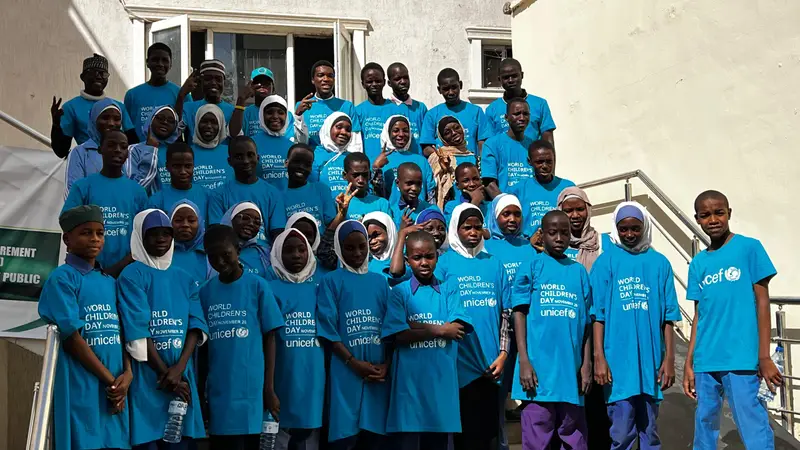Muhammad Alabira Nabordo
As Nigeria marks World Children’s Day, the United Nation Children Education Fund (UNICEF) Chief of Field Office Kano, Rahama Mohammed Farah, has unveiled the Nigerian Child 2025 Report, painting a stark picture of the challenges facing the country’s children.
The report reveals that millions of children in the North are out of school, and many who attend struggle to learn due to overcrowded classrooms, insecurity, and poverty.
He stated this recently at Tahir Quest Palace Kano, venue of the press conference attended by Journalists from Katsina, Kano and Jigawa states.
He said Katsina, Kano, and Jigawa states account for 16% of Nigeria’s 10.2 million out-of-school children, with Katsina alone having over 300,000 children out of school, Kano nearly 900,000, and Jigawa more than 330,000.
He explained that this situation is dire, with child marriage and harmful practices prevalent, and over half of the girls in rural areas married before age 18.
Farah also said Malnutrition is a major concern, with more than half of children under five stunted in Katsina (64.6%), Kano (51.9%), and Jigawa (55.7%). The situation he said is alarming, and urgent action is needed to address this ticking time bomb.
However, he said there is hope. The Masaki Initiative, a community-driven program in Jigawa State, has shown promising results in addressing child malnutrition.
Adding that the initiative has become a model for other states, with UNICEF and the state government working together to tackle this challenge.
He said Jigawa State has recorded improved immunization outcomes in the last ten years, saying thanks to the partnership with UNICEF. Adding that this progress is a testament to what can be achieved with collaboration and commitment.
Stressing that Jigawa and Kano states have made significant investments in healthcare, allocating one billion Naira each for RUTF procurement. Said this commitment to healthcare is a step in the right direction.
Farah said the CRIBS project has strengthened maternal, newborn, and child health services in 12 PHCs in Jigawa State, with water and sanitation facilities rehabilitated and improved in schools and health facilities.
In this he said, the Nigeria Learning Passport is providing increased access to education in Kano, Jigawa, and Katsina states, offering hope for a brighter future for Nigeria’s children.
Stating that UNICEF is calling for collaborative action by the government, stakeholders, development partners, communities, and Civil Society Organizations (CSOs) to change the situation.
As Farah reaffirms, “UNICEF is committed to working hand in hand with government, development partners, communities, and CSOs to ensure that every Nigerian child can survive, learn, and thrive.”
He therefore warned that the future of Nigeria’s children is at stake. So it is time for collective action to ensure that every child in Nigeria can live, learn, and grow with dignity and safety. “The Nigerian Child 2025 Report is a wake-up call, and it is up to us to answer”, he concluded.



